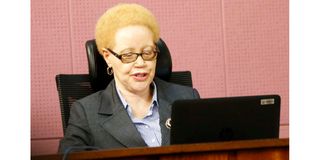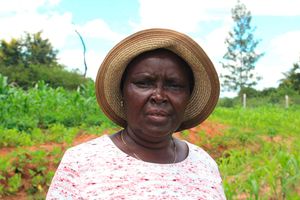
Two brothers have failed to prevent their 'stepmother' from inheriting their father's multi-million shilling property.
Two brothers have failed to prevent their 'stepmother' from inheriting their father's multi-million shilling property, despite claiming she was an employee in his businesses, not a wife.
Mr Johnny Nyaga and Moffat Nyaga argued that the relationship between their father Eustace Kagau, who died in 2006, and Ms Philis Wanjue was not a spousal engagement but an employer-employee association.
They insisted that she was neither a widow nor a dependent of their father, hence she should not be appointed a co-administrator of the estate.
However, the Court of Appeal in Nairobi backed the High Court's finding that Ms Wanjue was a widow of the businessman considering their long cohabitation and the gifts she received from him. In addition, her children were his dependants.
Evidence of marriage
"The High Court examined evidence of marriage, including a joint affidavit sworn by Kagau and Ms Wanjue in 1987, photographs depicting family gatherings, and hospital records listing her as his next of kin. The court also considered the evidence of long-term cohabitation, spanning over two decades, during which Kagau was publicly acknowledged as Ms Wanjue’s husband," said the Court of Appeal judges bench led by Jamila Mohammed. Other judges on the bench were Mumbi Ngugi and Fred Ochieng'.
The brothers had said that their father was in a monogamous marriage with their mother Ann Njoka having married her at the CMS Church at Kigali Embu in 1945. They argued that he had no legal capacity in the circumstances to marry another woman.

The properties at the centre of the succession case include 39 land parcels, shares in ten companies and firms, cash in 43 bank accounts and five motor vehicles. The case has been in court for 19 years following the family disagreement involving rightful heirs of the estate.
The siblings told the court that Ms Wanjue was a close confidant of their father. The court heard that she worked at his businesses such as Top Life Bar before being employed as a clerk at the Embu Suppliers.
They said she worked there in that capacity up to the date of his death and she became a business confidant due to the nature of her duties and she was able to have access to confidential family business information. They added that by the time she was employed by their father, she had three children.
But the Court of Appeal said the presumption of marriage has nothing to do with the law of marriage as such, whether this be ecclesiastical, statutory or customary.
"The doctrine of presumption of marriage, as reaffirmed in prior judicial decisions, provides that long cohabitation and reputation as husband and wife can give rise to a rebuttable presumption of marriage. The High Court found that Kagau had treated Ms Wanjue as his wife in both public and private settings, and there was no evidence to disprove this relationship," said the judges.
Informal marital arrangement
The court explained that the doctrine serves as a safeguard, ensuring that the rights of individuals in informal marital arrangements are recognised and protected under the law.
On the two siblings' contention that their father's prior statutory marriage precluded the existence of a subsequent customary marriage, the court held that prolonged cohabitation as man and wife gives rise to a presumption of marriage.
"In view of the appellant’s inability to dislodge Ms Wanjue’s claim for a presumption of marriage, the facts (including the transfer of properties during the lifetime of Kagau to her), it is more probable that she was a wife and not an employee as alleged by the appellants," the court said.

Justice Fred Ochieng'.
"We have also noted the half-hearted admission where the appellants plead, in the alternative, that the High Court should have considered the gifts given to Ms Wanjue during Kagau's lifetime as sufficient provision for her and a valid reason for her exclusion. The perfection of the gifts is more probable in the context of familial interdependence that goes beyond an employer-employee relationship alleged by the appellants," the court added.
Succession dispute
Stating that Ms Wanjue was entitled to be a co-administrator of the estate, the court underlined the High Court's finding that Kagau had acknowledged and maintained Ms Wanjue’s children by providing for their welfare and education.
The genesis of the succession dispute is a failure by Kagau's widow, Ann Njoka, to include Ms Wanjue as a co-administrator of the estate.
The judges directed the file to be transferred to the High Court in Embu for the parties to file the summons for confirmation of grant.
The case has been marked by various disputes including the biological relationship of Ms Wanjue's children to the late businessman.
In April 2008 a court ordered for conduct of a deoxyribonucleic acid (DNA) on her two children, Faith Rachel Wambeti and Immaculate Mercy Njura, to determine whether the two were biological children of Kagau.
His remains were to be exhumed for that purpose but pathologist Emily Adhiambo Rogena, who obtained samples from the two children, as well as from the body, stated that she was unable to produce a DNA profile from the remains for comparison.
She blamed it on the nature of the chemical used to embalm the body before burial.
While fighting to be appointed an administrator of the estate, Ms Wanjue stated that during her relationship with the businessman, she even adopted his middle name as part of her identification.
She alleged that she had four children with him, being Irene Wawira, Judy Wanjira, Faith and Immaculate. She claimed that she lived with him up to the point of death, and she was the one who rushed him to hospital after collapsing at his place of work. She further stated that Kagau also had a third wife, who was also deceased.












